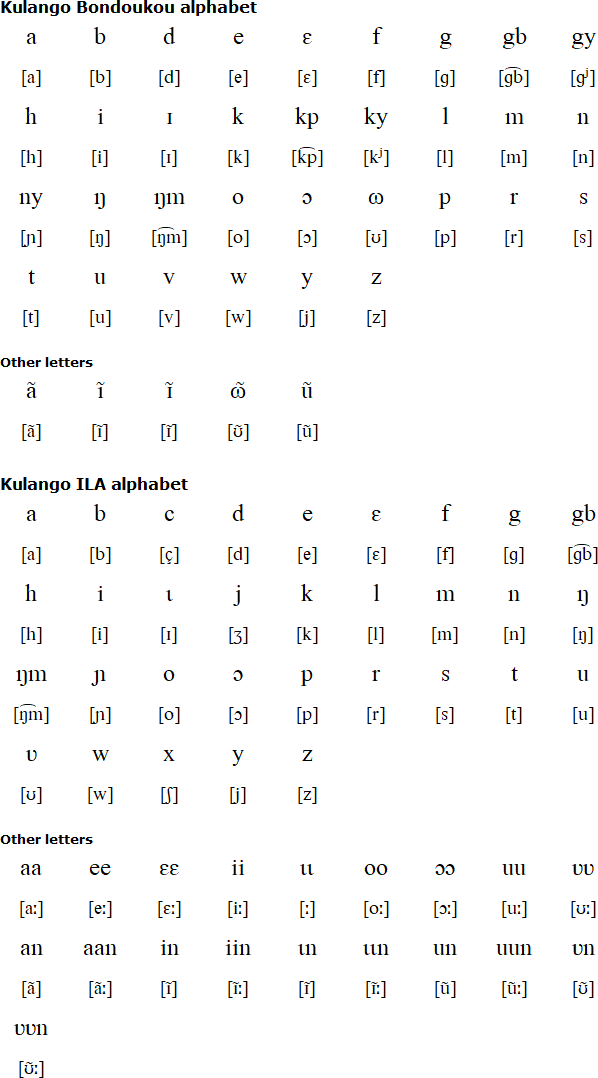Kulango is a member of the Gur branch of the Niger-Congo language family. It is spoken by about 470,000 people in Ivory Coast and Ghana. In particular, it is spoken in the Bouna Department of the Bounkani Deparment and the Bondoukou Department in the Gontougo Region, both of the which regions are part of the Zanzan District in the northwest Ivory Coast. It is also spoken in the Brong-Ahafo region in central Ghana.
Kulango is also known as Koulango, Kolango, Kulange, Nkorang, Nkurange, Nkoramfo, Nkuraeng or Kulamo. There are two main varieties: Kulango of Bondoukou or Goutougo, and Kulango of Bouna. They differ significantly from each other, and could be considered as separate languages.
Kulango can be written with the Latin alphabet. An orthography for Kulango of Bondoukou was used in that area in the 1990s. There is another orthography, created by the Institut de linguistique appliquée (ILA - Institute of Applied Linguistics) of the University of Abidjan-Cocody

Download Kulango alphabet charts (Excel)
Igooyoo pɛɛ hʋn taa. Bɔ pɛɛ jabaga bɔrɔ. Hɔ ya gʋʋn’n bɔɔ hɛ pɛɛ, hɔ hɛ gusɛgɛ’n.
All human beings are born free and equal in dignity and rights. They are endowed with reason and conscience and should act towards one another in a spirit of brotherhood.
(Article 1 of the Universal Declaration of Human Rights)
Information about Kulango
https://en.wikipedia.org/wiki/Kulango_language
https://fr.wikipedia.org/wiki/Koulango_(langue)
https://www.koeppe.de/titel_grammaire-kulango-parler-de-bouna-cote-d-ivoire
https://www.101lasttribes.com/tribes/kulango.html
Berba, Birifor (Northern), Birifor (Southern), Dagaare, Dagbani, Frafra, Gourmanchéma, Hanga, Kabiye, Kasem, Konkomba, Kulango, Kusaal, Láá Láá Bwamu, Mampruli, Mbelime, Moba, Mossi, Nateni, Ngangam, Ntcham, Paasaal, Safaliba, Sisaali, Tammari, Tem, Tumulung Sisaala, Turka, Waama, Western Sisaala
Languages written with the Latin alphabet
Page created: 22.08.24. Last modified: 22.08.24
[top]
You can support this site by Buying Me A Coffee, and if you like what you see on this page, you can use the buttons below to share it with people you know.

If you like this site and find it useful, you can support it by making a donation via PayPal or Patreon, or by contributing in other ways. Omniglot is how I make my living.
Note: all links on this site to Amazon.com, Amazon.co.uk
and Amazon.fr
are affiliate links. This means I earn a commission if you click on any of them and buy something. So by clicking on these links you can help to support this site.
[top]